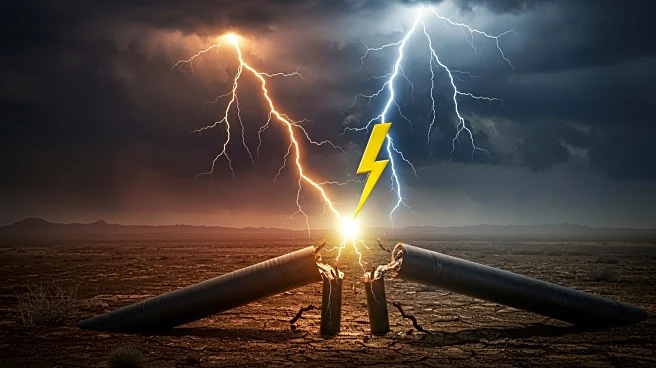What's Happening?
Hungary has issued a threat to cut off electricity supplies to Ukraine following Ukrainian drone strikes on the Druzhba pipeline, which delivers Russian oil to Central Europe. The strikes have halted oil flows to Hungary and Slovakia, leading to heightened tensions between Hungary and Ukraine. Hungarian Foreign Minister Péter Szijjártó criticized the attacks, calling them 'outrageous and unacceptable,' and accused Ukraine of compromising Hungary's energy security. Ukraine's Foreign Minister Andrii Sybiha responded by reminding Hungary that Russia initiated the conflict and accused Hungary of maintaining energy dependence on Russia. The Druzhba pipeline is crucial for Hungary and Slovakia, as they are the only EU countries still receiving significant amounts of Russian pipeline oil due to exemptions from EU sanctions.
Why It's Important?
The threat from Hungary to cut electricity supplies to Ukraine underscores the complex geopolitical dynamics in Eastern Europe, particularly concerning energy security. Hungary's reliance on Russian oil and its potential leverage over Ukraine through electricity supplies highlight the interconnectedness of energy and political stability in the region. This situation could affect EU energy policies and relations, as Hungary and Slovakia's continued import of Russian oil contrasts with broader EU sanctions. The European Commission is monitoring the situation, emphasizing the importance of energy security. The outcome of this dispute could influence EU strategies on energy independence and security, especially in light of ongoing tensions with Russia.
What's Next?
The European Commission is in contact with Hungary and Slovakia to address the situation, focusing on maintaining energy security. Experts are working to restore the damaged pipeline station, but the timeline for resuming oil transport remains uncertain. Hungary's threat to cut electricity could escalate tensions further, potentially impacting Ukraine's energy supply and stability. The EU may need to mediate to prevent further deterioration of relations and ensure energy security for all member states involved. Continued dialogue and negotiations are likely as stakeholders seek to resolve the conflict and mitigate its impact on regional energy dynamics.
Beyond the Headlines
Hungary's threat to Ukraine highlights broader ethical and political questions about energy dependency and sovereignty. The reliance on Russian energy sources poses challenges for EU countries striving for energy independence and security. This situation may prompt discussions on diversifying energy sources and reducing reliance on politically volatile regions. Additionally, the conflict underscores the vulnerability of energy infrastructure to geopolitical tensions, raising concerns about the security and resilience of critical energy networks.











